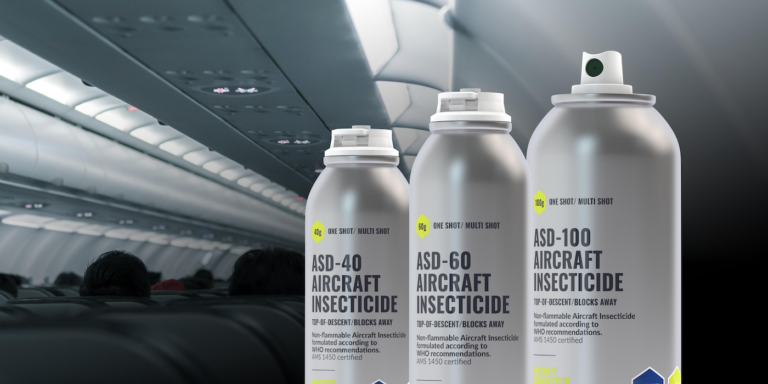An aerosolised insecticide for use in aircraft cabins has become the first such product in the world to receive approval for sale and use in all 27 Members States of the European Union, including Iceland, Norway and Switzerland. The insecticide, named ‘Aircraft Insecticide ASD’, has been developed by Aero-Sense, a Belgium-based manufacturer of aviation chemicals, in collaboration with Honeywell’s Industrial Aerosols department.
Insecticides are used on board aircraft to prevent the spread of vector-borne diseases such as malaria, zika and dengue via air travel. The specific methods and products to be used for aircraft disinsection are specified in World Health Organization (WHO) recommendations, as well as in IATA and ICAO guidelines. Aero-Sense develops and formulates its products according to these recommendations and guidelines, but Aircraft Insecticide ASD is the first to also acquire a Union Authorisation under the European Biocidal Products Regulation (BPR). The BPR examines whether a biocide, such as an insecticide, is harmless to humans and the environment. For example, according to the BPR, no carcinogenic, endocrine disrupting, or toxic substances may be present in the product.
“Only a product that is 100% tested for conformance with safety requirements passes this strict evaluation process,” stated Jochen Rosseel, COO of Aero-Sense.
Aero-Sense added in a statement that, “A striking and underlying conclusion is that there are currently many airlines who use a non-regulated insecticide in their European flights.”
Aircraft Insecticide ASD is dispensed using Honeywell’s non-flammable Solstice propellant, which meets the European Regulation on the use of fluorinated greenhouse gases, requiring technical aerosols to have a Global Warming Potential (GWP) of less than 150. Some previous-generation aircraft insecticides have a GWP of more than 1,300 as they contain harmful HFCs. Aero-Sense says that switching to the new propellant has reduced the GWP of its insecticide to less than 1, far exceeding the EU requirements.
“Unfortunately, the environmental aspect is still often overlooked by airlines, especially in the economically tough times we are experiencing now,” added Rosseel. “However, it would be very useful to think of this aspect as it allows airlines to reduce the ecological footprint of each flight and achieve their emission targets.”
Such considerations are becoming more important, especially as national environmental standards are becoming stricter. In 2019, the EU and 108 other countries worldwide signed the Kigali amendment to the Montreal Protocol. This international and legally binding agreement seeks to reduce the production and consumption of harmful HFC gases.





